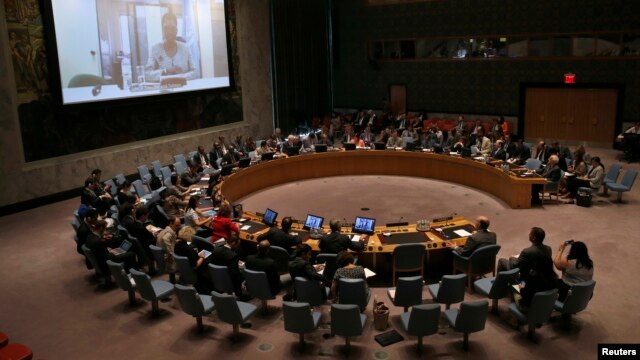UN Membership Fills 5 Security Council Seats
October 16, 2014 2:32 PM
UNITED NATIONS—
U.N. member states elected five countries to the Security Council on Thursday, each for a two-year term.
Angola, Venezuela and Malaysia were put forth by their regional groups and ran uncontested, easily achieving more than the two-thirds majority of votes needed to validate their victories.
The only suspense in Thursday’s ballot was in the group known as “Western Europe and Others”. WEOG, as it is known, is not a strictly regional group as it includes far-flung members such as Britain, Canada, Australia and Israel.
In that group Turkey, Spain and New Zealand vied for only two available council seats. New Zealand captured a two-thirds majority in the first round, but Spain and Turkey had to go through two more rounds of ballots before Spain prevailed.
Speaking after the results, Malaysia’s Foreign Minister Anifah Aman noted that this year has been a difficult one for his nation following two airliner crashes.
“Malaysians from all walks of life have come together, to stand together and unite behind the nation. It is my hope that Malaysia’s election to U.N. Security Council will similarly unite all Malaysians, particularly as we pursue interests in the realm of international peace and security as a member of the Security Council," said Aman.
Analyst and Executive Editor of Independent Diplomat Carne Ross tells VOA he expects Venezuela will probably echo its foreign policy opinions inside the council.
“Of course a recurring theme is hostility to the United States and its interference, as they see it, in Latin America," said Ross.
Venezuela’s Foreign Minister Rafael Ramirez appeared to seize on that right away, saying his country had won its seat despite a “maligned campaign” against his country and would seek to defend developing countries from its seat on the council.
“We take up this challenge, determined to continue our fight against the willingness to subject countries to the subjugation, domination, exploitation and foreign occupation and the denial of fundamental human rights," said Ramirez.
In a statement, U.S. Ambassador Samantha Power expressed disappointment that Venezuela was put forward by Latin American and Caribbean countries as their nominee. She said council candidates should support the principles of the U.N. Charter, including promoting universal respect for human rights. She noted that Venezuela has failed to do this and that the United States would continue to call upon Venezuela to respect the fundamental freedoms and universal human rights of its people.
Countries normally begin their campaigns for council seats years in advance. In the run up to Thursday’s vote there were parties and small souvenirs - such as Turkish delight, New Zealand licorice and Venezuelan chocolates - to sweeten voters’ moods.
The winners will take their seats on the 15-nation council January 1 and replace outgoing members Argentina, Australia, Luxembourg, South Korea and Rwanda. voa


No comments:
Post a Comment